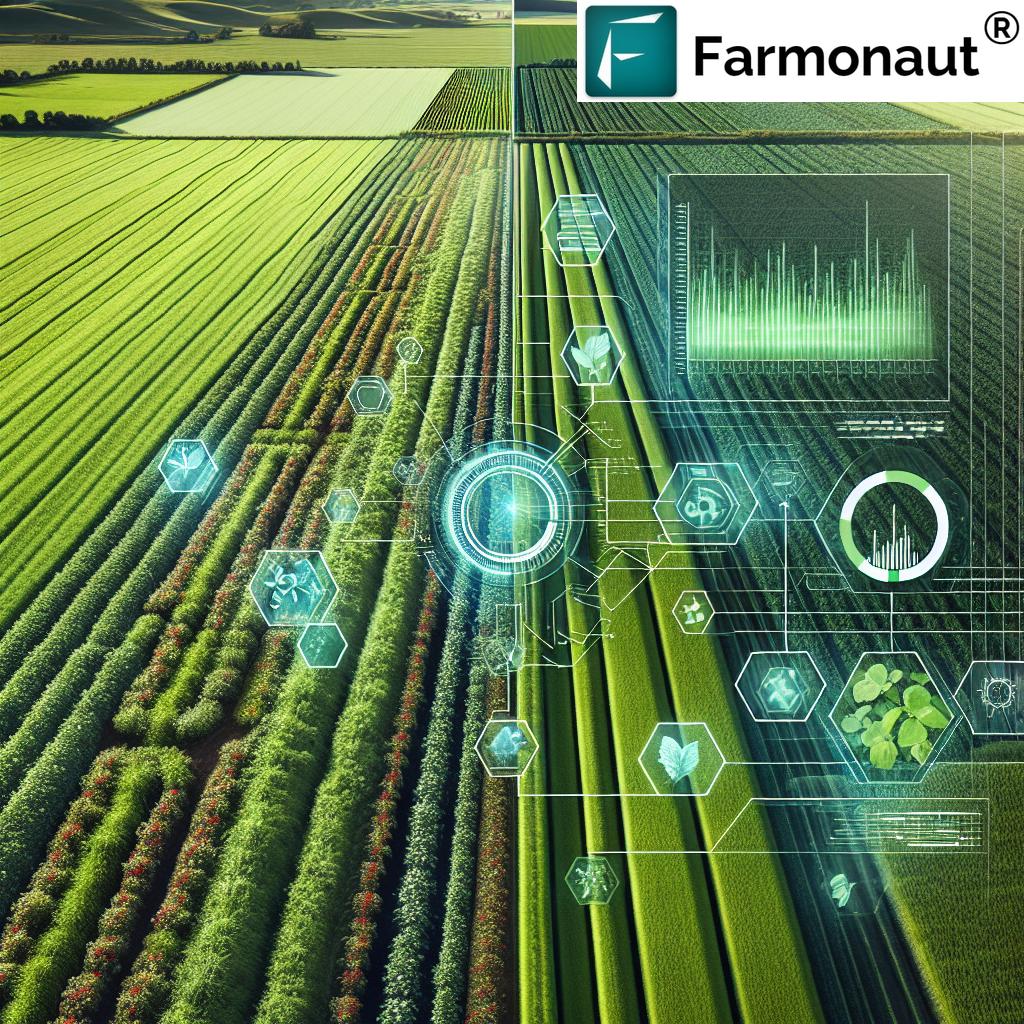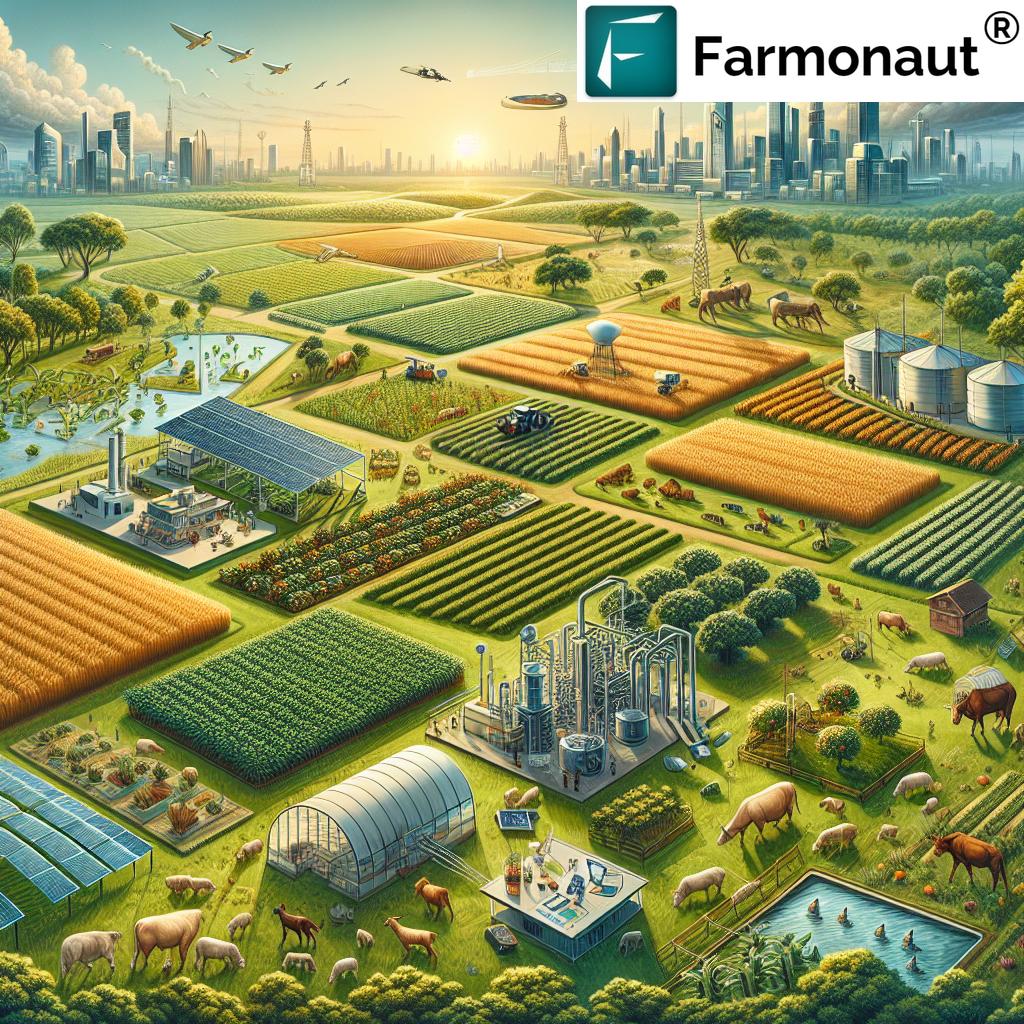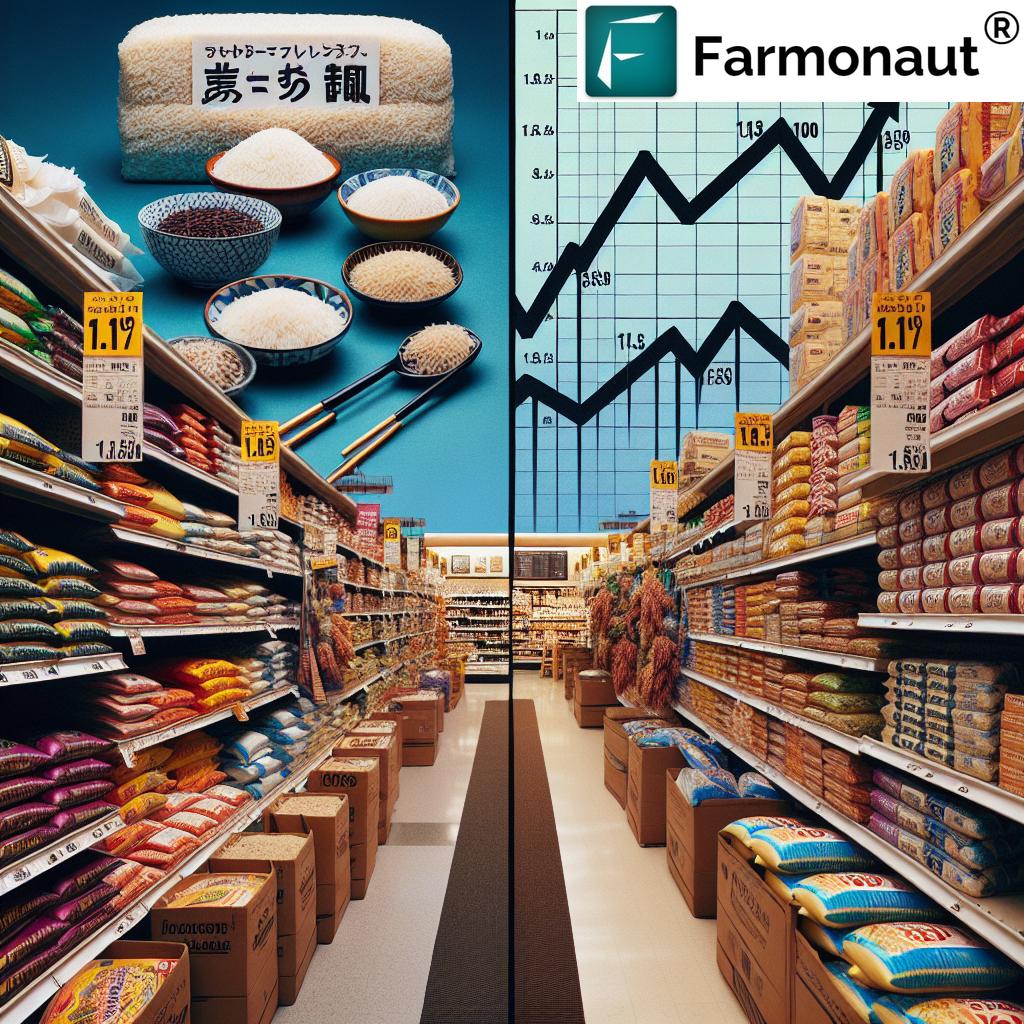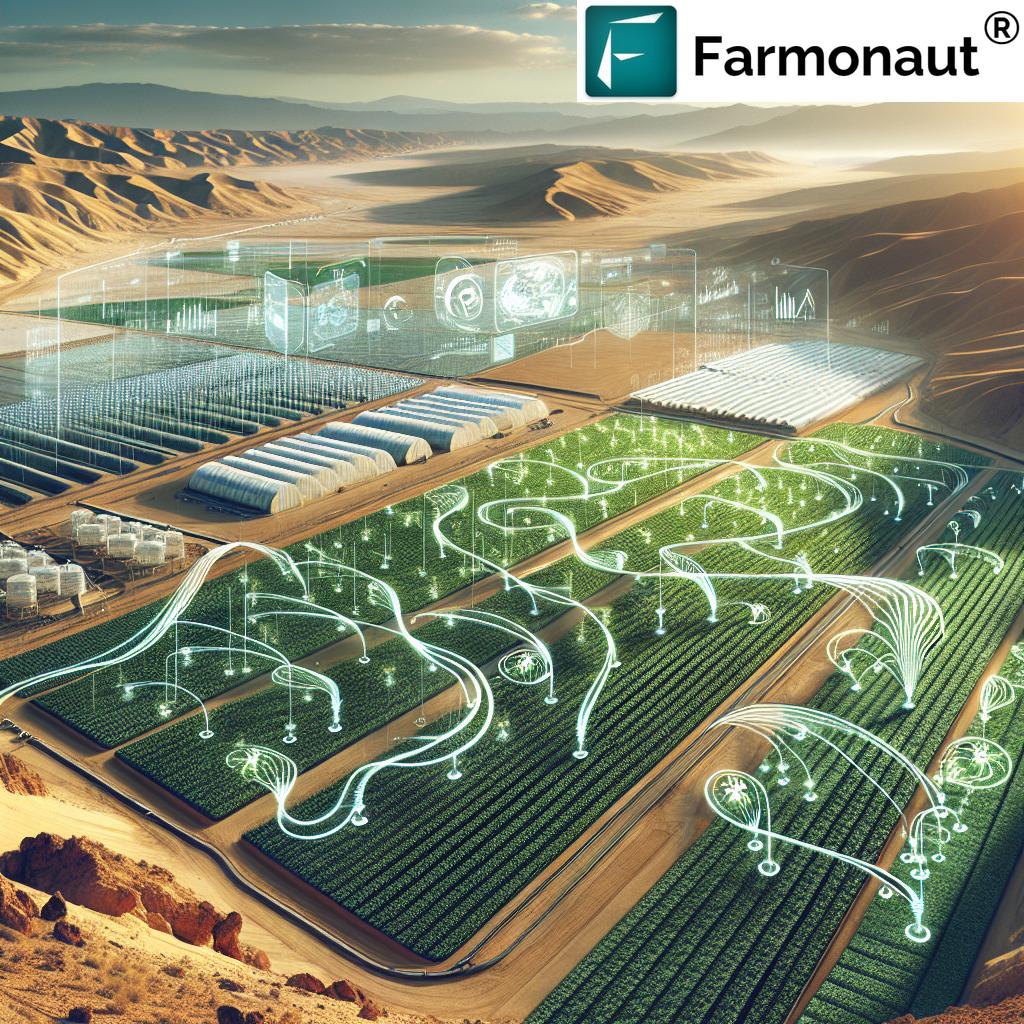Latest Technology in Farming India: 7 Innovations 2025
“By 2025, AI-driven tools are projected to increase Indian crop yields by up to 20% through precision agriculture.”
- Introduction: The Rise of Agri-Tech in 2025
- 2025 Trends: Latest Technology in Farming
- Comparative Innovations Table: 7 Breakthroughs in Indian Agriculture
- 1. Precision Agriculture: Data, Drones, and Decision-Making
- 2. Artificial Intelligence and Machine Learning in Agriculture
- 3. Autonomous Machinery: Robotic Revolution in the Fields
- 4. Latest Technology in Dairy Farming: Sensors, Wearables, and Real-Time Health
- 5. Digital Platforms, Mobile Apps, and Marketplace Connect
- 6. Latest Organic Farming Technology: Sustainable by Design
- 7. Blockchain, Traceability, and Transparency in Agri Supply Chains
- Farmonaut: Affordable & Accessible Precision Agri-Tech
- Frequently Asked Questions
- Conclusion: The Future of Sustainable Indian Agriculture
Introduction: The Rise of Agri-Tech in 2025
In the recent years, the agricultural sector of India has witnessed transformative advancements driven by the latest technology in farming. From precision agriculture and AI-powered practices to automation, IoT sensors, and blockchain-based traceability, these innovations are revolutionizing farming, boosting productivity and profitability, and enhancing sustainability for Indian farmers. As we move into 2025, the integration of these technologies is addressing vital environmental concerns and food security challenges, securing a bright future for farming in India and globally.
With small and marginal land holdings, erratic monsoon patterns, and increasing labor shortages, it has become essential for Indian farmers to embrace the latest agriculture technology in India to remain competitive and ensure food security. Government initiatives, forward-thinking startups, and robust digital infrastructure have further accelerated the adoption of modern technologies—not just for crop production, but also for dairy operations and organic farming.
2025 Trends: Latest Technology in Farming
The latest technology in farming for 2025 encompasses a diverse mix of advancements designed to optimize every aspect of agriculture, dairy, and organic practices. Here’s what is making waves in modern Indian farms:
- Satellite-based crop health monitoring and field surveillance
- AI/ML-powered advisory for weather, crop cycles, pest and disease control
- IoT sensor networks for precise irrigation, fertilization, and soil management
- Autonomous and robotic machinery replacing manual labor
- Automated milking & herd management in dairy farms
- Blockchain-backed supply chain traceability for food safety
- Biofertilizers, smart composters & organic input automation
- Mobile-driven digital platforms providing farm analytics, credit, and market links
Focus Keyword: latest technology in farming, latest technology in dairy farming, latest agriculture technology in India, latest organic farming technology
“Over 60% of Indian dairy farms are expected to adopt smart sensors for herd management by 2025.”
Comparative Innovations Table: 7 Breakthroughs in Indian Agriculture
| Innovation Name | Technology Type | Primary Application | Estimated Yield Improvement (%) | Sustainability Impact (Water/Fertilizer Reduction %) |
Adoption Rate in India (%) | Notable Example / Brand |
|---|---|---|---|---|---|---|
| Satellite-Based Precision Agriculture | Satellite, AI, IoT | Crop Management | 15–25% | Up to 35% | 30% | Farmonaut, ISRO Bhuvan |
| AI & Machine Learning Advisory | AI, ML, IoT | Pest/Disease Forecasting, Yield Estimation | 10–20% | 15–30% | 25% | Farmonaut Jeevn AI, CropIn |
| Autonomous Robotic Machinery | Automation, Robotics | Planting, Harvesting, Spraying | 15–30% | 10–30% | 12% | John Deere, Mahindra |
| Smart Dairy Farming Sensors | IoT, Wearables | Herd/Health/Milk Management | 15–25% | 10–20% | 35% (expected) | Cowlar, Stellapps, DeLaval |
| Biofertilizers & Biopesticides Integration | Biological, Sensors | Soil Health, Pest Control | 8–15% | 25–40% | 20% | IARI, UPL, Ankur Seeds |
| Blockchain-Based Traceability | Blockchain, IoT | Supply Chain, Food Security | 6–10% | – | 10% | Farmonaut, BigBasket |
| Digital Market & Advisory Platforms | AI, Mobile, Cloud | Advisory, Credit, Market Linkage | Up to 10% | 12–20% | 50%+ | Kisan Suvidha, Farmonaut |
1. Precision Agriculture: Data, Drones, and Decision-Making
Precision agriculture remains at the forefront of modern farming in India, utilizing a synergy of satellite imagery, GPS-guided tractors, drone surveillance, and IOT sensors. Employing these technologies enables farmers to monitor crop health using real-time data, manage soil conditions, assess moisture levels, and execute resource-efficient irrigation and fertilization.
- Satellite imagery provides actionable crop health data (NDVI, SAVI) across large fields.
- IoT sensors embedded in soil monitor moisture, temperature, and nutrient levels.
- Drones support aerial field surveillance, pest scouting, and precise input delivery.
- Data-driven alerts enable early detection of disease or pest outbreaks.
Through these advancements, farmers can reduce input costs, improve yield, and lower their environmental footprint. Precision farming (the latest technology in farming) is driving higher profitability and food security—especially as Indian farming deals with climate volatility and water scarcity.
Farmonaut is empowering farmers globally with affordable precision agriculture. Our platform uses multispectral satellite images, real-time crop health monitoring, and AI-powered advisory for fields—making precision farming accessible even to smallholders.
Use our Farmonaut API & developer docs for seamless satellite data & weather integration in enterprise applications. Unlock precision agri-solutions across your operations—even at scale!
2. Artificial Intelligence and Machine Learning in Agriculture
The latest technology in farming leverages artificial intelligence (AI) and machine learning (ML) to process vast datasets from satellites, field sensors, and drones—analyzing everything from weather patterns to pest outbreaks in real time.
- Yield prediction algorithms help plan harvests and logistics.
- Pest and disease detection systems allow early intervention—reducing crop loss.
- AI-driven irrigation and fertilization advice enables resource optimization.
- Personalized digital “crop doctor” apps bring advanced guidance to every farmer’s smartphone.
India’s adoption of Jeevn AI-based advisory, AI-powered pest alerts, and digital weather platforms is improving productivity. With tailored management of irrigation, fertilization, and pest control by harnessing real-time data, AI is making agriculture less wasteful and more sustainable.
Our Jeevn AI system at Farmonaut delivers real-time insights, custom crop plans, and expert weather-based recommendations—directly through mobile, web, and API access. See how we empower India’s farmers to outsmart pests, diseases, and unpredictable weather!
For robust large-scale farm management and advanced analytics, our Agro-Admin App streamlines entire plantation or multi-farm operations with unprecedented precision.
3. Autonomous Machinery: Robotic Revolution in the Fields
The next leap in latest technology for farming involves autonomous machinery—from robotic planters and AI-guided harvesters to unmanned ground vehicles (UGVs) for pest control and weed management. Automation addresses the acute labor shortages facing Indian agriculture, while improving efficiency and product quality.
- Robotic tractors conduct precise sowing, fertilization, and soil preparation.
- Autonomous harvesters minimize losses and enable multi-crop farming.
- Spraying drones deliver fertilizers/pesticides with pinpoint efficiency, reducing input costs.
Adoption of machines by brands like Mahindra, John Deere, and Indian agri-tech startups is projected to double by 2025, aiding small and large farms alike. Robotics and automation form the backbone of modern farming practices, facilitating precision and sustainability.
Want deeper oversight of your fleet and resource management? Farmonaut provides end-to-end control and operational insights for your field machinery. This lowers costs and boosts safety—discover our dedicated fleet management solutions for Indian agribusinesses.
4. Latest Technology in Dairy Farming: Sensors, Wearables, and Real-Time Health
The dairy industry is evolving rapidly in India, embracing the latest technology in dairy farming to enhance milk yield, animal health, and overall farm management. Automation, real-time biosensors, and AI-driven analytics are redefining Indian dairy operations.
- Automatic milking systems (AMS) and “robotic milkers” allow cows to be milked on demand, improving animal comfort and milk quality.
- Wearable biosensors & smart collars track vital signs, heat cycles, and behavioral changes—enabling early disease detection and precise breeding management.
- Precision feeding systems use AI to tailor diets for optimum productivity and cow welfare.
- Digital, app-powered farm dashboards streamline milk logistics, resource scheduling, and herd analytics.
Over 60% of Indian dairy farms are expected to adopt sensor-led solutions by 2025. This transition is enhancing milk output and profitability, while also reducing antibiotic use and promoting animal welfare in line with global sustainability benchmarks.
Transparency is also essential: Blockchain-based traceability is reshaping the journey of dairy—from farm to shelf. Our Farmonaut traceability platform ensures product origin, authenticating safe, ethical, and high-quality milk and dairy products for the global market.
5. Digital Platforms, Mobile Apps, and Marketplace Connect
One of the latest agriculture technology in India booms is the proliferation of digital platforms and mobile advisories for farmers. These apps and online services have become lifelines for millions, especially smallholders in rural regions.
- AI-enabled crop guidance available in regional languages on easy-to-use mobile apps
- Access to weather forecasts, fertilizer/bio-input suggestions, pest alerts, and price discovery
- One-stop marketplace for credit, insurance, and government advisory/incentives
- Digital payment and blockchain for transparent, fast transactions
Farmonaut’s platform, accessible via android, iOS, browser, and API, provides affordable access to cutting-edge farm analytics, satellite crop health, irrigation advisories, and more—helping Indian farmers thrive, compete, and mitigate risk in 2025 and beyond.
Getting affordable crop loans and insurance is easier with Farmonaut crop verification, which utilizes secure satellite-backed validation to save time and empower the rural economy.
6. Latest Organic Farming Technology: Sustainable by Design
Indian organic farming is on the rise—with technology adoption transforming age-old techniques into scalable, sustainable solutions. Here’s how:
- Bio-digester units convert waste into organic fertilizers, supporting circular, low-input farming cycles.
- Soil sensors and rapid microbial testing monitor soil microbiota, ensuring healthy, balanced, chemical-free growth.
- Automated composting solutions speed up humus production—replenishing nutrients between crop cycles.
- Robotic weeders and biocontrol agents automate pest management, reducing or eliminating the need for synthetic pesticides.
This latest organic farming technology is helping India reduce environmental pollution, preserve biodiversity, and meet soaring demand for certified, residue-free food.
Track and reduce your environmental footprint with Farmonaut’s carbon footprinting solutions. Our platform delivers real-time emission and abatement reporting—ideal for organic and sustainable farms aiming for international certification and market access.
7. Blockchain, Traceability, and Transparency in Agri Supply Chains
Blockchain is one of the latest technology for farming globally, driving traceability and transparency in agri-food supply chains in India. As buyers increasingly demand proof of safe, ethical sourcing—from milk to organic grains—blockchain is proving invaluable.
- Digital records of each crop or batch, immutably stored on-chain
- Real-time farm-to-shelf traceability, enhancing food safety and reducing fraud
- Consumer trust—buyers authenticate source, handling, and certification instantly
- Streamlined export compliance, increasing India’s global agricultural market share
With blockchain-based traceability solutions, Indian agriculture can meet export, regulatory, and domestic transparency standards—enabling higher prices and more efficient recalls or audits.
See how Farmonaut’s product traceability technology lets agri-enterprises and cooperatives fetch instant end-to-end tracking—whether for organic, dairy, or food supply chains—powered by blockchain and secure IoT data.
Farmonaut: Affordable & Accessible Precision Agri-Tech
At Farmonaut, we continuously strive to make latest technology in farming affordable and broadly accessible, integrating satellite, AI, blockchain, and machine learning for Indian farmers and agribusinesses. Our modular platform brings together:
- Satellite-based crop health and moisture analytics—optimized farm inputs, minimized loss
- AI/ML-powered advisory (Jeevn AI)—tailored, real-time insights on irrigation, weather, disease, and crop management
- Blockchain-based traceability—supply chain transparency for both food companies and sustainability-conscious consumers
- Fleet/resource and carbon management tools—lowering input costs, environmental footprints, and regulatory risk
Our subscription model is built for flexibility—serving individual farmers, large agribusinesses, cooperatives, and government agencies alike. Accessible via web, mobile apps, and robust APIs, Farmonaut’s mission is making data-driven, high-yield, and sustainable farming mainstream and affordable in India for 2025 and beyond.
Frequently Asked Questions
Q1: What is the latest technology in farming in 2025?
The latest technology in farming includes satellite-based crop health monitoring, AI-driven advisory for pest/disease forecasts, drones, IoT sensor networks, blockchain supply chain traceability, and autonomous machinery. These technologies empower farmers to boost yield, efficiency, and sustainability.
Q2: How is Farmonaut helping farmers in India?
We enable precision agriculture via accessible, satellite-powered insights, AI/ML advisories, blockchain-backed product traceability, and integrated resource management. Farmers benefit from reduced input costs, maximized yields, and sustainable farming practices—all directly on mobile, web, or through seamless API integration.
Q3: How does AI improve farming efficiency and crop yield?
AI analyzes real-time data from satellites, sensors, and weather feeds to provide decision support—notifying farmers about the perfect timing for irrigation, fertilization, pest treatment, and harvesting. This reduces waste, increases productivity, and cuts down risk.
Q4: What are the latest technologies in dairy farming in India?
The latest technology in dairy farming comprises AMS (automated milking), wearable biosensors for herd health, AI-driven precision feeding, digital traceability, and cloud-based management tools. These improve milk yield, optimize feeding, and ensure animal welfare.
Q5: Can organic farmers benefit from these advancements?
Absolutely. Organic farming technologies—like microbial soil testing, automated composters, and blockchain traceability—enable better yields, certification, and market access, while maintaining strict sustainability and chemical-free standards.
Q6: How do digital platforms change Indian agriculture?
They bridge the information and opportunity gap, giving all farmers instant market access, advisories, weather/pest alerts, and digital payment modes—even in remote or resource-poor areas, fostering inclusive economic growth and resilience.
Conclusion: The Future of Sustainable Indian Agriculture
2025 is shaping up as a defining moment for Indian and global farming. The convergence of digital, biological, and automation technologies will continue to boost crop and milk yield, streamline management, and strengthen food security. The latest technology in farming and latest agriculture technology in India is not just about profitability—it’s about creating a resilient, sustainable, and transparent food system capable of facing environmental, economic, and social challenges.
As farmers, agribusinesses, and policymakers strive to realize this vision, companies like Farmonaut will keep on democratizing precision farming tools and data-driven insights for the fields—no matter the scale or geography. The quest for sustainability, productivity, and quality in Indian agriculture is only just beginning—let’s empower every Indian farmer with the right technology for a flourishing future.

- Learn more about carbon footprinting for sustainable farm management →
- Explore blockchain-enabled traceability for supply chain transparency →
- Crop loan & insurance made simple with Farmonaut satellite verification →
- Optimize large-scale farm operations with the Agro-Admin App →
- Fleet management for cost-effective, safe field logistics →
Ready to transform your field, dairy, or organic farm with the latest technology in farming? Download the Farmonaut app—make data, AI, and sustainability work for you in 2025.











